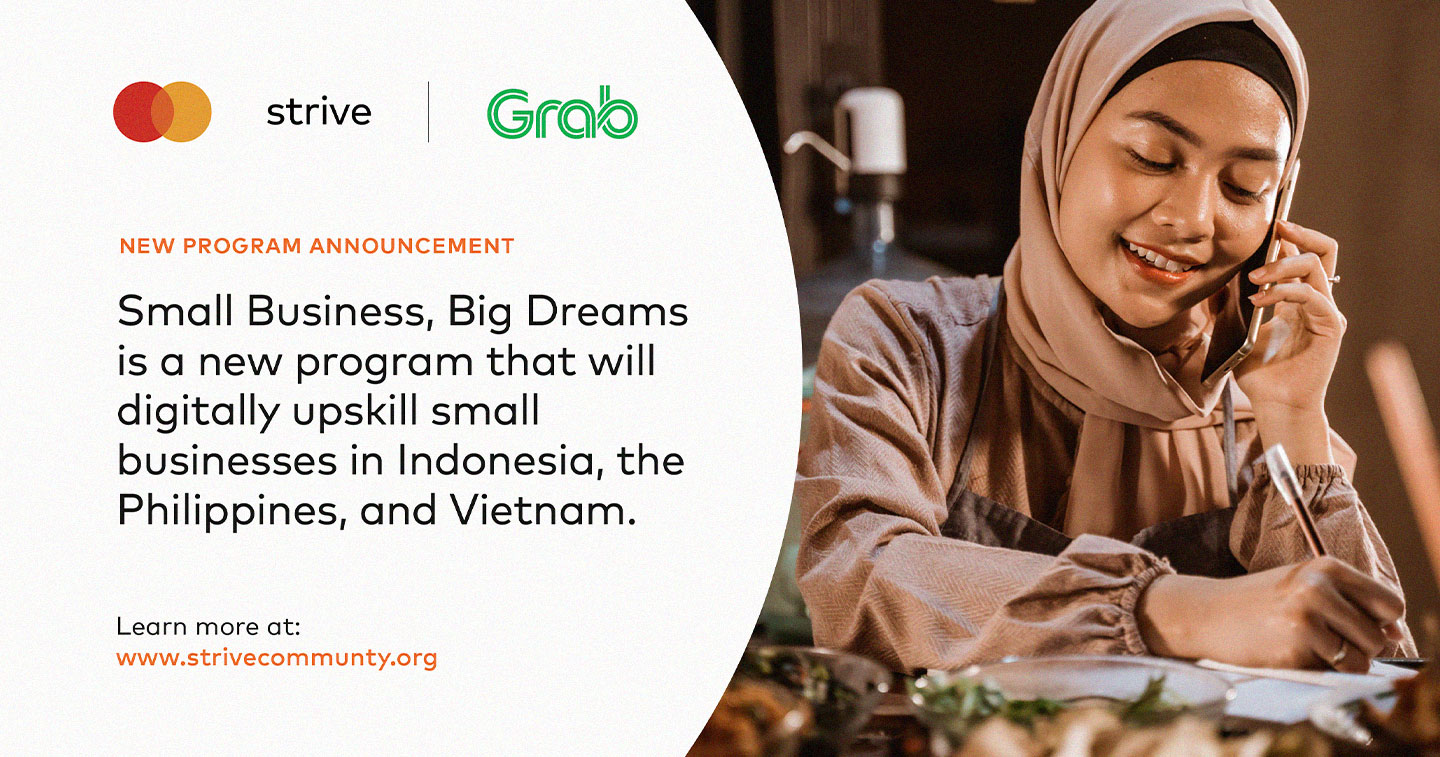SINGAPORE — Mastercard and Grab, Southeast Asia’s leading superapp, announced the “Small Business, Big Dreams” regional program to digitally upskill gig economy workers and small businesses in Indonesia, the Philippines, and Vietnam. The collaboration is part of Strive Community, a global philanthropic initiative developed by the Mastercard Center for Inclusive Growth and Caribou Digital. Strive Community aims to support the resilience and growth of five million small businesses around the world.
The “Small Business, Big Dreams” regional program includes the launch of two online business courses for Grab’s driver and delivery-partners aspiring to start new businesses, and small business owners seeking to grow in a competitive digital economy. It aims to enable small businesses to reach their full potential by supporting them to digitize their operations, unlock their access to financial services and more effectively participate in the digital economy.
“Many Southeast Asians working in the informal sector aspire for more, but the reality is that a lot of them do not have the means or the opportunity to access quality training programs. Through our partnership with the Mastercard Center for Inclusive Growth, we hope to give gig workers and small businesses a boost to get started. Our ‘Small Business, Big Dreams’ program will equip them with business knowledge and practical skills through a structured learning journey tailored to their needs and interest areas,” said Cheryl Goh, Group Head of Marketing and Sustainability at Grab.
“The digital economy offers a range of possibilities and opportunities that can help businesses of all sizes be more resilient and grow. Mastercard is delighted to work with Grab on this initiative that will boost digital capacity and inclusion among aspiring entrepreneurs and small businesses post-pandemic,” said Payal Dalal, Senior Vice President of Social Impact for International Markets at Mastercard Center for Inclusive Growth.
“Mastercard has globally committed to bring a total of 1 billion people and 50 million micro and small businesses into the digital economy by 2025. Today’s announcement follows on the success of Mastercard Academy 2.0 in Indonesia, Business Cell in Philippines, and BSR’s HER Project Digital Wage in Cambodia, and Care Ignite in Vietnam, which have empowered millions of small businesses to access technology, training, mentorship, and financial services,” she added.
Small businesses play a vital role in Indonesia, the Philippines, and Vietnam, contributing up to 60% of the GDP of these economies. Despite 80-90% of small- and medium-sized enterprises in Southeast Asia losing income due to COVID-19 lockdowns, many were able to skirt this hit by going digital, with online businesses’ profits rebounding more quickly. This resilience is what this micro-learning program seeks to bring to an abundance of small businesses and aspiring entrepreneurs across the region.
Bespoke courses to boost entrepreneurship in Southeast Asia
The two new online courses, namely the Driver Entrepreneurship Toolkit and the Small Business Toolkit, were created based on survey insights from over 34,000 driver-partners and 600 small businesses in the region. Although almost all small businesses surveyed use smartphones for their businesses, 42% still rely solely on paper and pen to manage their businesses.
“I want to learn about pricing and expense management – it seems complicated. Commodity prices fluctuate over time. As an entrepreneur, we should have training on how to price correctly so that you don’t lose money or go over budget,” a café owner from the Philippines shared.
“I was introduced to some financial tools such as a POS but I do not use it yet because I am not sure it is appropriate for my business. For financial records, I do this manually,” said a food seller from Vietnam.
As for driver-partners, the three most sought-after training topics were: how to grow the business and increase profits (62%), how to start a new business (58%); and how to market the business online (30%).
“I’m interested to know how to start a business with just a small amount of capital. Today, many people don’t have the budget due to the pandemic. I also want to know how to expand a business without having to shell out huge capital,” said a driver-partner from the Philippines.
“I haven’t had a chance to attend any business training. If training teaches us how to develop a business from scratch, I’m interested,” said a driver-partner from Indonesia.
To meet these aspirations, Mastercard and Grab have engaged leading local small business experts, such as Tumbu, WISE, and Bayan Academy, to jointly develop the online courses. The courses, which comprise 20 short video lessons each, provide practical steps to address the challenges frequently faced by small businesses and first-time entrepreneurs. It also features powerful and relevant insights from local industry experts and peer business owners, a preferred learning format by surveyed driver-partners and small business owners.
“Research has found that during the pandemic, digital commerce adoption among micro-small businesses increased by only about 5%, while 44% of medium and large businesses reported selling online. There is an urgent need for scalable training programs to help millions of micro businesses in Southeast Asia to build their digital entrepreneurship skills and boost their readiness to grow,” said Dewi Meisari, CEO of Tumbu Accelerator. “Grab and Mastercard’s digital upskilling initiative enables us to provide relevant, flexible yet structured training modules at scale.”
The training videos are available free of charge to all Grab Partners on GrabAcademy, via the Grab Driver and Merchant superapps. Driver-partners will receive certificates of completion when they finish each module.













